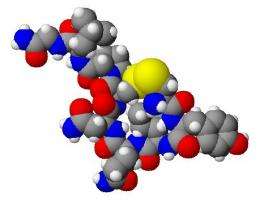April 1, 2014 report
Research duo finds oxytocin promotes group-serving dishonesty

(Medical Xpress)—A pair of researchers, one in Israel the other in the Netherlands has found that volunteers given oxytocin tend to be more willing to lie if it benefits a group they belong to. In their paper published in Proceedings of the National Academy of Sciences, the two also noted that the volunteers were not more likely to lie if it would benefit only themselves.
The hormone oxytocin has been studied extensively over the past several years, with some giving it nick-names for supposed benefits it imbues—the love drug or the moral molecule, for example. Both are simplistic, of course as scientists know that any drug that modifies emotions or logical thinking is likely to also have negative impacts as well. In any case, in this latest study, the two researchers sought to better understand whether oxytocin might cause people to lie more under certain conditions. To learn more, they enlisted the assistance of 60 male volunteers—some were asked to inhale a mist containing oxytocin, others a placebo.
All of the volunteers were asked to play a virtual coin toss guessing game. In the first round, they were told that correct guesses would result in a €1 coin payoff that would be shared equally with the group. In the second round, the payoff would not be shared. To determine if they would lie about how often they guessed correctly, they were not monitored—all of the volunteers should have reported being right approximately 50 percent of the time, but they did not. What was interesting though was that the volunteers that had sniffed oxytocin reported being right 80 percent of the time, versus 67 percent of those who sniffed the placebo. Perhaps even more surprising, when the payoff would not benefit the whole group, those who'd sniffed oxytocin didn't lie any more than did those who'd sniffed the placebo. This suggests, the researchers note, that oxytocin appears to increase the likelihood that people will lie for the benefit of the group but not for themselves.
The researchers also report that those volunteers given oxytocin also lied faster than those on the placebo, responding over half a second faster than those given a placebo, suggesting they found lying to be easier when their brains were being impacted by the presence of the hormone.
More information: Oxytocin promotes group-serving dishonesty, PNAS, Shaul Shalvi, DOI: 10.1073/pnas.1400724111
Abstract
To protect and promote the well-being of others, humans may bend the truth and behave unethically. Here we link such tendencies to oxytocin, a neuropeptide known to promote affiliation and cooperation with others. Using a simple coin-toss prediction task in which participants could dishonestly report their performance levels to benefit their group's outcome, we tested the prediction that oxytocin increases group-serving dishonesty. A double-blind, placebo-controlled experiment allowing individuals to lie privately and anonymously to benefit themselves and fellow group members showed that healthy males (n = 60) receiving intranasal oxytocin, rather than placebo, lied more to benefit their group, and did so faster, yet did not necessarily do so because they expected reciprocal dishonesty from fellow group members. Treatment effects emerged when lying had financial consequences and money could be gained; when losses were at stake, individuals in placebo and oxytocin conditions lied to similar degrees. In a control condition (n = 60) in which dishonesty only benefited participants themselves, but not fellow group members, oxytocin did not influence lying. Together, these findings fit a functional perspective on morality revealing dishonesty to be plastic and rooted in evolved neurobiological circuitries, and align with work showing that oxytocin shifts the decision-maker's focus from self to group interests. These findings highlight the role of bonding and cooperation in shaping dishonesty, providing insight into when and why collaboration turns into corruption.
© 2014 Medical Xpress


















